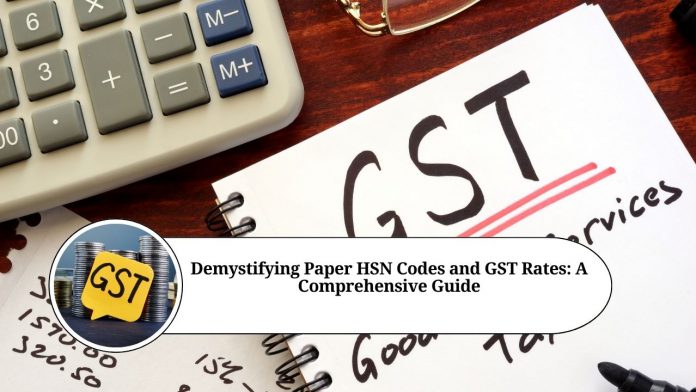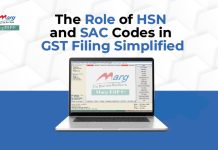Introduction:
The implementation of the Goods and Services Tax (GST) system in India has significantly simplified the taxation structure for various goods and services. Under the GST regime, each item is assigned a unique Harmonized System of Nomenclature (HSN) code and corresponding GST rates. In this blog, we will delve into the HSN code and GST rates applicable to paper products in India, providing a clear understanding of their classification and taxation.
HSN Code for Paper Products:
HSN codes are a globally accepted system for classifying goods and services. They play a crucial role in determining the taxability and rate of GST applicable to specific products. When it comes to paper and paper products, they fall under Chapter 48 of the HSN code, which covers paper and paperboard, articles of paper pulp, and other materials used in the paper industry.
To provide a more detailed classification, the HSN code for paper products is further divided into various subcategories based on factors such as composition, functionality, and usage. Some commonly used HSN codes for paper products include:
HSN Code 4801: Newsprint, in rolls or sheets.
HSN Code 4802: Uncoated paper and paperboard, except for newsprint.
HSN Code 4803: Toilet paper, facial tissues, and similar products.
HSN Code 4804: Kraft paper and paperboard.
HSN Code 4805: Other uncoated paper and paperboard.
HSN Code 4806: Vegetable parchment, greaseproof papers, and tracing papers.
HSN Code 4808: Paper and paperboard, corrugated (recycled).
GST Rates for Paper Products:
The GST rates for paper and paper products vary depending on the HSN code and the nature of the product. The applicable GST rates for different paper products are as follows:
Newsprint (HSN Code 4801): 5% GST.
Uncoated paper and paperboard (HSN Code 4802): 12% GST.
Toilet paper, facial tissues, and similar products (HSN Code 4803): 12% GST.
Kraft paper and paperboard (HSN Code 4804): 12% GST.
Other uncoated paper and paperboard (HSN Code 4805): 12% GST.
Vegetable parchment, greaseproof papers, and tracing papers (HSN Code 4806): 12% GST.
Paper and paperboard, corrugated (recycled) (HSN Code 4808): 12% GST.
Importance of Proper HSN Code Classification:
Accurate classification of products under the appropriate HSN code is crucial for businesses to comply with GST regulations. Assigning the correct HSN code ensures that the correct GST rate is applied, avoiding any potential discrepancies or penalties. Additionally, it aids in maintaining proper records and facilitates the seamless filing of GST returns.
Conclusion:
Understanding the HSN code and GST rates for paper products is essential for businesses operating in the paper industry. The HSN code classification enables businesses to determine the correct GST rate applicable to their products, ensuring compliance with the GST framework. By staying up-to-date with the latest GST rates and maintaining accurate records, businesses can navigate the taxation system effectively and streamline their operations.
Read More Useful Content:
- Top Benefits of E-Invoicing Software For Your Business
- Best e-Invoicing Software to Simplify Your GST e-Invoicing
- E-invoicing – Guide On E-Invoicing System In India
- How to Generate Electronic Invoicing (e-Invoicing) in Marg ERP Software
- GST E-invoice
Frequently Asked Questions (FAQs)
Q1: What is an HSN code?
A1: HSN stands for Harmonized System of Nomenclature. It is a globally accepted system for classifying goods and services. HSN codes are used to identify and categorize products for taxation purposes.
Q2: How do I find the HSN code for a specific paper product?
A2: You can find the HSN code for a paper product by referring to the official HSN code list or by using online resources provided by government authorities or tax portals. You can search for the specific paper product or its description to identify the corresponding HSN code.
Q3: How are GST rates determined for paper products?
A3: GST rates for paper products are determined based on the HSN code assigned to each product. The government sets the GST rates for different categories of paper products, taking into account factors such as their nature, composition, and usage.
Q4: Can GST rates for paper products change over time?
A4: Yes, GST rates for paper products can be revised by the government through notifications and amendments. It is essential to stay updated with the latest GST rates through official sources to ensure compliance.
Q5: Are there different GST rates for different types of paper, such as newsprint and packaging paper?
A5: Yes, different types of paper may have different GST rates. For example, newsprint typically attracts a lower GST rate compared to packaging paper. The applicable GST rates are determined by the HSN code and the nature of the product.
Q6: How do I apply the correct GST rate for my paper products in my business?
A6: To apply the correct GST rate for your paper products, you need to determine the appropriate HSN code for each product. Once you have the HSN code, you can refer to the GST rate schedule or consult a tax professional to ensure accurate tax calculation.
Q7: Can I use the same HSN code for similar paper products with different GST rates?
A7: No, it is important to use the correct HSN code for each specific paper product. Different paper products may have different GST rates, even if they appear similar. Using the correct HSN code ensures accurate taxation and compliance.
Q8: Do the GST rates for paper products vary based on the size or quantity?
A8: No, GST rates for paper products are generally not based on size or quantity. They are primarily determined by the HSN code and the nature of the product.
Q9: Are paper products exempt from GST?
A9: No, paper products are not exempt from GST. However, different paper products may have different GST rates ranging from 5% to 12% based on their classification.
Q10: Can I claim input tax credit (ITC) on the GST paid for paper products?
A10: Yes, as a registered business, you can claim input tax credit on the GST paid for paper products used in your business activities, provided you meet the necessary conditions and comply with the GST regulations regarding ITC claims.




















